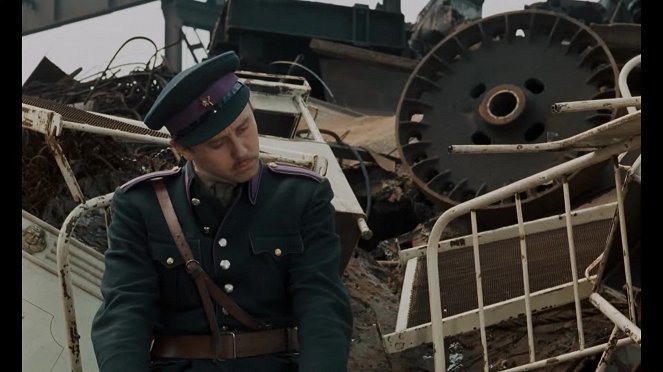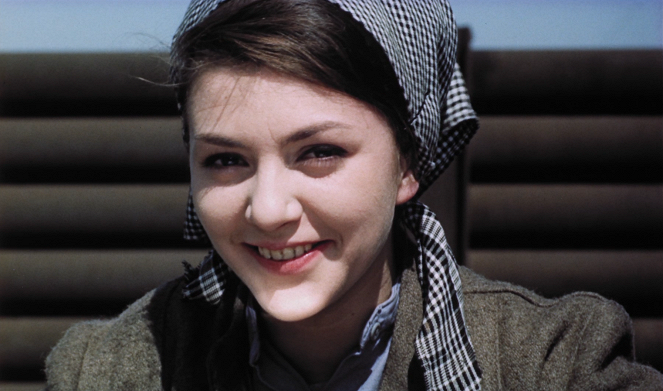Director:
Jiří MenzelCámara:
Jaromír ŠofrMúsica:
Jiří ŠustReparto:
Rudolf Hrušínský, Vlastimil Brodský, Václav Neckář, Jitka Zelenohorská, Jaroslav Satoranský, Vladimír Šmeral, Ferdinand Krůta, František Řehák (más)Sinopsis(1)
En la ciudad de Kladno y durante los procesos de "rectificación" comunistas de 1950, se da cita un peculiar conjunto de personajes represaliados en torno a una fundición que recicla los signos del antiguo orden para fabricar nuevos tractores y máquinas. Por una parte, una cuadrilla de operarios forzosos y por otra, están los rostros llenos de vida de una serie de prisioneras condenadas a trabajos forzados. En medio de la coreografía se dibuja la silueta endeble de un estólido guardián incapaz de atajar la hermosa historia de amor que florece entre el joven cocinero Pavel (Václav Neckář) y la prisionera Jitka (Jitka Zelenohorská). Basada en la colección de relatos cortos Anuncio una casa donde ya no quiero vivir, del célebre escritor Bohumil Hrabal, y prohibida durante más de veinte años, Alondras en el alambre constituye una de las obras más representativas del movimiento aperturista checoslovaco conocido como la Primavera de Praga. (Intermedio)
(más)Videos (3)
Reseñas (6)
Quite symbolically, Menzel's film ends with a long shot of the descent into the darkness underground – because that was its destiny for years to come. One of the last examples of free cinema of the 1960s now gives off a raw and unchained impression – different image quality, sharp cuts, flaws in the image, all reminiscent of the forced oblivion that caught up to Larks on a String. The creative method chosen by the screenwriter Menzel-Hrabal duo is also raw. A harsh poem in film prose, where the lyrical part is provided by the dismal camera runs on the panorama of the steel kingdom of the beautiful Poldi, the epic one with fragmented and strongly stylized dialogues. Larks on a String is a unique narrative affair that says little about its actors, the main speech amounts to the magnificent acting of all involved, and then the deliberately uncommented absurdity that Hrabal and Menzel sophisticatedly put into a provocative mosaic. It does not complain and pathetize, but in the style of the New Wave it documents and reveals the true form of things, their essence, it casts into the world the terrifying absurdity of the 1950s in all its sheer nakedness. We find a parallel with Hrabal's poetry (Krásná Poldi) and prose (Inzerát na dům, ve kterém už nechci bydlet), but also with the complaining narrative neutrality of the novelist Josef Jedlička (“Kde život náš je v půli se svou poutí"). The symbolic world of the scrap yard, which mirrors its times, is an obvious metaphor for transforming man into amorphous blocks of scrap, excellently captured characters in turn corresponding to the sample of society after a class battle... One of the best testimonies about a cursed time, which requires an attentively perceptive viewer. I guess that's why it's never going to become a generally accepted classic.
()
I did not experience that period, I do not feel the chills in historical situations, and surely many connections will escape me. But I simply do not believe in the optics of rose-colored glasses shown through forced warm dialogues in bad conditions and sudden infatuation without reflection on the future. Menzel's clumsiness, emphasized by the gaping naivety of Neckář and the babbling female cast, is a combination that is currently wearing me down to the point that any funny situations or pleasantly absurd lines get lost in the mess around.
()
Together with Kachyna’s The Ear, for me one of the best films dealing with the morally warped time of the 1950s, full of ideological bullshit, fear of repression, informers, and enthusiastic builders, begging in letters for the harshest punishment for Milada Horáková. And Jiří Menzel, hand in hand with Hrabal's source material, is unique. While most of our recent post-revolutionary films have tried to approach the unfortunate period of the 1950s through "big fatal" dramas, where they push hard enough to make a boulder shed a tear, Menzel makes do with beautiful poetic narrative, where he even pulls out the stops to portray the oppressive atmosphere of the time, with hints, a slight melancholy, the would-be humanist bullshit of a apparatchik (a brilliant Hrušinský) and a mere shot of a State Security car waiting for its "prey" outside a factory entrance. And the shots of endless rows of ingots and piles of sheet metal and iron junk give it a snazzy period atmosphere.
()
Cutting It Short or The Snowdrop Festival may be very popular, and it's understandable, but I consider Larks on a String and Closely Watched Trains as the pinnacle of the combination of Bohumil Hrabal's text and Jiří Menzel's imagery. This is not just easy humor; it's a deep dive into the thoughts and behaviors of people of their time, presented with insight and in a visually captivating way. Yes, it's funny, but there's a chilling undercurrent beneath the laughter. The brief appearance of Věra Galatíková as a seasoned comrade says more about the tragedy of the era than hours of dull history lessons or lectures by historians. Plenty of lines that hit close to home, exceptionally strong cast, and a peculiar, melancholic poeticism make this film a compelling watch. It's smart filmmaking, where Menzel can evoke mood and emotions with a single shot of a heap of scrap metal, something another filmmaker might need several minutes for. For me, it's one of the peaks of Czech cinematography. Overall impression: 100%.
()
The confession of Bohumil Hrabal about subversive activities in the communist state has precisesly that decent or even mythical humor you get when you watch any Hrabal-inspired movie directed by Jiří Menzel. Larks on a String aren’t any worse than for example Cutting It Short or The Snowdrop Festival. I like The Snowdrop Festival the best only because the forest locations in Kersko are a tad more pleasant than the steelworks in Poldi, Kladno.
()



Anuncio